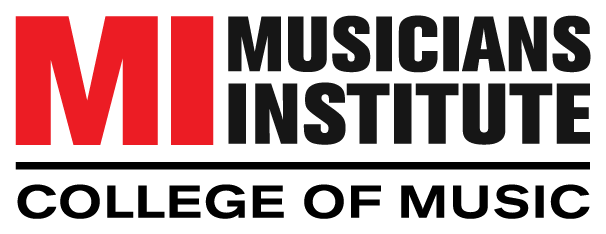In today’s music industry, the line between performing and producing is more connected than ever. A great performance must be captured, shaped, and produced into something that resonates beyond the stage. At Musicians Institute, students don’t learn these disciplines in isolation. Instead, performers in programs like vocals, bass, and keyboards collaborate directly with students in audio engineering programs, creating an immersive environment that mirrors professional music-making.
Why Performance and Production Must Work Together
A strong vocal, bassline, or keyboard performance can only reach its full potential when it’s captured and produced correctly. At the same time, engineers need performers to practice recording techniques, mixing, and live sound. Musicians Institute recognizes this natural interdependence and has built its curriculum to bring both groups together.
This collaboration isn’t just convenient, it’s essential. Performers learn how their work translates in the studio, and engineers gain experience working with real artists. Together, they build skills that prepare them for careers where communication, teamwork, and mutual understanding are critical.
Hands-On Recording Sessions
One of the most direct ways Musicians Institute bridges performance and production is through recording sessions. Vocalists, bassists, and keyboardists frequently find themselves in Musicians Institute’s state-of-the-art studios, laying down tracks while audio engineering students handle microphone placement, gain staging, and monitoring.

Blog Post
"*" indicates required fields
By submitting this form, I authorize Musicians Institute (MI) to make or allow the placement of calls, emails, and texts to me at the phone number that I have provided, including through the use of automated technology, or a prerecorded or artificial voice. I understand that I am not required to provide my phone number as a condition of purchasing any property, goods, or services. I agree to the terms of MI’s Privacy Policy. MI will not sell or rent your information to third parties, and you may unsubscribe at any time.
For performers, this provides practical exposure to working in professional studios. They learn how to adapt their performance for microphones, take direction from engineers, and deliver consistent takes. For engineers, it’s an invaluable chance to work with live musicians—adjusting levels, experimenting with mic setups, and learning how to capture nuance in real time.
Live Performance Meets Live Sound
Collaboration extends beyond the studio. Musicians Institute’s Live Performance Workshops give students the chance to perform in ensemble settings while audio engineering students manage the sound. These workshops simulate gigs where performers focus on stage presence and delivery, while engineers handle mixing, EQ, and live recording.
This dynamic environment prepares both sides for careers in touring, live events, and session work. Performers graduate understanding how to communicate with sound engineers during concerts, while engineers leave ready to support artists on stage.
Shared Language Between Artists and Engineers
Communication is one of the most important skills in music. A performer may want their vocal to feel “warmer,” while an engineer may think in terms of EQ adjustments. By working together during training, Musicians Institute students learn how to bridge these language gaps.
This shared vocabulary benefits everyone. Performers become more precise in describing their needs, while engineers learn to interpret artistic language into technical adjustments. These skills often determine how smoothly professional sessions run, and Musicians Institute students get to practice them early.
Technology as a Common Ground
The Musicians Institute’s curriculum also emphasizes technology as a unifying element. Performers work with DAWs to create demos, while audio engineering students master mixing and production workflows. When they collaborate, they speak a shared technological language—whether it’s using Musicians Institute DI controllers, sequencing software, or mixing plug-ins.
For example, a keyboardist may program a synth patch in Logic, then hand it off to an engineering student to integrate into a session. This interplay mirrors professional workflows where ideas move fluidly between creators and technical experts.
Portfolio Development Through Collaboration
One of the most tangible benefits of collaboration at Musicians Institute is portfolio development. Performers leave with professionally recorded demos, live videos, and studio tracks that showcase their abilities. Engineering students graduate with credits on those same projects, demonstrating their skill in capturing and producing music.
This exchange gives both performers and engineers a competitive edge. Employers, record labels, and clients expect candidates to have real work to show—and at Musicians Institute, every student leaves with a portfolio built through meaningful collaboration.
Career Outcomes From Shared Experience
This curriculum design sets graduates on diverse and sustainable career paths.
- For performers: They leave with the confidence to walk into any studio or venue, understanding how to work with technical teams. This prepares them for careers as recording artists, session musicians, and touring performers.
- For engineers: They gain practical experience with live musicians, giving them the flexibility to work in recording studios, live sound, and post-production.
- For both: They build professional networks that often continue after graduation, forming creative partnerships that can grow into long-term collaborations.
Why Musicians Institute’s Approach Works
Many schools teach performance and production separately. What makes Musicians Institute unique is its holistic approach—recognizing that musicianship today requires fluency across disciplines. By creating structured opportunities for performers and engineers to work together, Musicians Institute ensures graduates are prepared not just as individual specialists but as collaborators who thrive in the professional world.
Ready to Learn in a Collaborative Environment?
Music doesn’t happen in isolation. At Musicians Institute, performers and engineers share the same spaces, the same sessions, and the same drive to create. This collaborative environment ensures that every graduate is industry-ready—equipped with both the artistry and the technical understanding to succeed.

